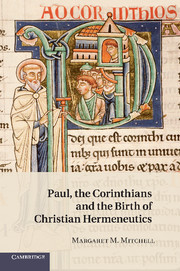Description
Paul, the Corinthians and the Birth of Christian Hermeneutics
Author: Mitchell Margaret M.
This book demonstrates how in the Corinthian letters Paul was fashioning the principles that later exegetes would use to interpret scripture.
Language: English
Subject for Paul, the Corinthians and the Birth of Christian...:
Approximative price 49.66 €
In Print (Delivery period: 14 days).
Add to cart
Paul, the Corinthians and the Birth of Christian Hermeneutics
Publication date: 08-2012
Support: Print on demand
Publication date: 08-2012
Support: Print on demand
Approximative price 71.14 €
In Print (Delivery period: 14 days).
Add to cart
Paul, the corinthians and the birth of christian hermeneutics
Publication date: 10-2010
194 p. · 15.2x22.9 cm · Hardback
Publication date: 10-2010
194 p. · 15.2x22.9 cm · Hardback
Description
/li>Contents
/li>
In a series of exchanges with the Corinthians in the mid-50s AD, Paul continually sought to define the meaning of his message, his body and his letters, at times insisting upon a literal understanding, at others urging the reader to move beyond the words to a deeper sense within. Proposing a fresh approach to early Christian exegesis, Margaret M. Mitchell shows how in the Corinthian letters Paul was fashioning the very principles that later authors would use to interpret all scripture. Originally delivered as The Speaker's Lectures in Biblical Studies at Oxford University, this volume recreates the dynamism of the Pauline letters in their immediate historical context and beyond it in their later use by patristic exegetes. An engagingly written, insightful demonstration of the hermeneutical impact of Paul's Corinthian correspondence on early Christian exegetes, it also illustrates a new way to think about the history of reception of biblical texts.
Preface; 1. The Corinthian diolkos: passageway to early Christian biblical interpretation; 2. The agôn of Pauline interpretation; 3. Anthropological hermeneutics between rhetoric and philosophy; 4. The mirror and the veil: hermeneutics of occlusion; 5. Invisible signs, singular testimonies: the agôn over interpretive criteria; 6. Hermeneutical exhaustion and the end(s) of interpretation; Bibliography; Index.
© 2024 LAVOISIER S.A.S.




